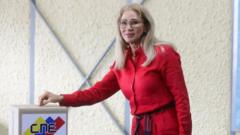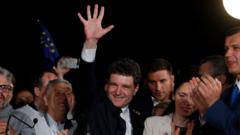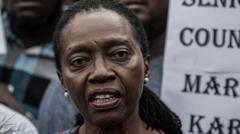Prime Minister Dick Schoof steps down, leading to uncertainty before a new election.
**Dutch Government Falls as Far-Right Leader Withdraws from Coalition**

**Dutch Government Falls as Far-Right Leader Withdraws from Coalition**
A sudden political upheaval ensues in the Netherlands as Geert Wilders exits the governing coalition over migration disputes.
The Dutch government has officially collapsed following Geert Wilders' withdrawal of his far-right Freedom Party (PVV) from the governing coalition, igniting a political crisis in the Netherlands. Prime Minister Dick Schoof announced his resignation and that of the cabinet during a televised address after an emergency cabinet meeting, where he described Wilders’ actions as “irresponsible and unnecessary.”
The governing coalition, which had been in power for less than a year, faced significant tension primarily over migration policies. Wilders had been advocating for additional asylum measures, including freezing applications and limiting family reunification—a move that led to their fallout. Despite Schoof's last-ditch effort to negotiate with coalition leaders on Tuesday morning, Wilders abruptly exited the meeting, thus ending the collaboration.
Political leaders expressed shock and disapproval, highlighting that many of Wilders' asylum demands were already included in the coalition agreement. Some proposals had even been dismissed during earlier negotiations due to legal concerns. The coalition, which included the largest party, the far-right PVV, and partners such as the conservative VVD, the Farmers' Citizen Movement (BBB), and the centrist New Social Contract, had appeared as a temporary arrangement marked by discord.
Following the breakup, Wilders' former partners accused him of deliberately triggering the crisis. VVD leader Dilan Yesilgoz characterized the decision as "super irresponsible," while BBB’s deputy Prime Minister Mona Keijzer expressed concerns over Wilders “betraying the Netherlands.” Nevertheless, Wilders has signaled his ambition to rise to the position of prime minister and boost the PVV's presence in future elections.
Despite the upheaval, economic analysts noted limited immediate financial repercussions due to the government's lack of implemented concrete plans during its short tenure. Current polling indicates a competitive political landscape, with far-right and Green-Left parties gaining traction amidst ongoing issues concerning migration and living costs.
As NATO prepares for a summit in The Hague later this month, Schoof's ministers are expected to serve in a caretaker role until new elections are announced, likely in the autumn. In the Dutch political system, forming a majority coalition is essential to take on the prime minister role, thus complicating Wilders' path forward after prioritizing personal ambitions over coalition stability. Should he focus on asylum policies in the upcoming campaign, there are no guarantees that this strategy will succeed given his party's recent involvement in the controversial issue for nearly a year.
The governing coalition, which had been in power for less than a year, faced significant tension primarily over migration policies. Wilders had been advocating for additional asylum measures, including freezing applications and limiting family reunification—a move that led to their fallout. Despite Schoof's last-ditch effort to negotiate with coalition leaders on Tuesday morning, Wilders abruptly exited the meeting, thus ending the collaboration.
Political leaders expressed shock and disapproval, highlighting that many of Wilders' asylum demands were already included in the coalition agreement. Some proposals had even been dismissed during earlier negotiations due to legal concerns. The coalition, which included the largest party, the far-right PVV, and partners such as the conservative VVD, the Farmers' Citizen Movement (BBB), and the centrist New Social Contract, had appeared as a temporary arrangement marked by discord.
Following the breakup, Wilders' former partners accused him of deliberately triggering the crisis. VVD leader Dilan Yesilgoz characterized the decision as "super irresponsible," while BBB’s deputy Prime Minister Mona Keijzer expressed concerns over Wilders “betraying the Netherlands.” Nevertheless, Wilders has signaled his ambition to rise to the position of prime minister and boost the PVV's presence in future elections.
Despite the upheaval, economic analysts noted limited immediate financial repercussions due to the government's lack of implemented concrete plans during its short tenure. Current polling indicates a competitive political landscape, with far-right and Green-Left parties gaining traction amidst ongoing issues concerning migration and living costs.
As NATO prepares for a summit in The Hague later this month, Schoof's ministers are expected to serve in a caretaker role until new elections are announced, likely in the autumn. In the Dutch political system, forming a majority coalition is essential to take on the prime minister role, thus complicating Wilders' path forward after prioritizing personal ambitions over coalition stability. Should he focus on asylum policies in the upcoming campaign, there are no guarantees that this strategy will succeed given his party's recent involvement in the controversial issue for nearly a year.





















